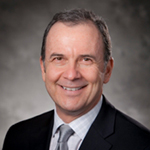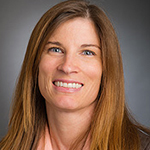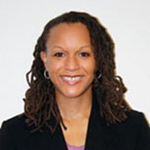
Practicing Mindfulness to Cut Medical Errors
During a grand rounds presentation hosted by the Osher Center for Integrative Medicine on October 29, Richard Gannotta, DHA, president of Northwestern Memorial Hospital, discussed how mindfulness – paying attention in an intentional way – can reduce medical errors and increase the wellbeing of healthcare providers.
He explained how Western thinkers have translated the practice rooted in Buddhist tradition to mean being aware in the present moment and actively noticing new things in modern-day scenarios. He highlighted research that shows how mindfulness can benefit medical professionals stuck in the rut of “mindlessness,” which he said happens when people see the same thing every day, feel distracted, hurried and overloaded and go on “autopilot.”
“When you approach a task, even if it’s washing your hands to see a patient or making a site mark before a surgery, it’s an opportunity to check in with your breath and use that as an anchor to become mindful and focused,” said Gannotta, who is also a health system clinician in Medical Education.
He asked audience members to focus on an object in the room, to engage in their breathing and appreciate the aspects they hadn’t noticed before.
“If this makes a difference with a mundane object during a 15-second exercise, imagine what it could do with one or two breaths when you’re doing a procedure to a patient,” he said.
Economically, mindfulness training could be an easy way to improve safety and the patient experience.
“We need something that we can teach a lot of people all at once – something incredibly scalable and dirt cheap to reproduce that could make a difference. I think that criteria make mindfulness training something that we need to consider when we look at the total toolbox to mitigate medical errors,” said Gannotta.
A video recording of the lecture is available for viewing here.

Incorporating Spirituality into Patient Care
Tracy Balboni, MD, MPH, associate professor in radiation oncology at Harvard Medical School, described how considering a patient’s spiritual beliefs can improve care during the 19th Annual James E. & Bonnie L. Eckenhoff Lecture, hosted by the Buehler Center on Aging, Health & Society at the Institute for Public Health and Medicine (IPHAM) weekly seminar series on October 30.
She began by walking audience members through the history of spirituality and the practice of medicine. In Western culture, spiritual and material healing practices began as seamlessly integrated concepts, but they morphed into separate domains over time.
“We would never want to go back to a time when we didn’t have the tools to cure disease, to alleviate suffering – we want that material focus. But we also want utter embrace of someone’s dignity, of who they are on a spiritual level, at the same time,” said Dr. Balboni, who is director of the Supportive and Palliative Radiation Oncology Service at the Dana-Farber/Brigham and Women’s Cancer Center.
She shared research explaining that many patients view illness as a spiritual experience and would like it incorporated into their care, as well as studies showing that spiritual care increases patient quality of life and leads to less aggressive end-of-life interventions. Dr. Balboni also addressed steps for incorporating spiritual care into practice, including taking a spiritual history and involving chaplaincy into care of the seriously ill.
A video recording of the lecture is available for viewing here.

Advocating for Scientific Research in Public Policy
Illinois deputy governor Cristal Thomas discussed efforts by the Illinois state government to promote scientific research and to carry out public health policy in a seminar organized by student group NU Edge on October 30.
“The government plays a major role and can have an influence on the national research agenda,” said Thomas, who oversees development and implementation of Governor Quinn’s public policy agenda.
She acknowledged that the government’s influence does not always forward scientific innovation, as in previous bans and restrictions on stem cell research.
“Those are ways that congress often weighs in to impose its own agenda, or sometimes the belief system of its more influential members, on the scientific community,” said Thomas. “When you look at committee hearings about global warming, for example, or the Affordable Care Act, a lot of the debate was not based on science.”
She called on students to pay attention and take an active role in political debates to ensure their government representatives make decisions based on factual evidence.
“I believe that it truly is important that we have people in all professions that are engaged in the democratic process, especially people who care about science and research,” said Thomas. “You don’t have to work in government to be a part of this conversation.”






